No, I have not been given a draft text of General Secretary Xi Jinping’s report to the 19th Chinese Communist Party (CCP) Congress, which will serve as the principal policy and programmatic document of the conclave. So I don’t know specifically what the section on Taiwan will say, but I can guess parts of it, based on previous reports. Those will provide the benchmark for assessing the significance of what Xi says during the meeting, which begins on October 18.
By way of background
Two points of context need to be kept in mind.
First of all, Xi is not the author of either the entire report or the specific section on Taiwan. A writing committee drafts the document as part of an iterative process of composing, vetting, soliciting opinion, and revising. The ruling Politburo of the CCP—not just its general secretary—will give final formal approval. Xi himself will have a greater opportunity to shape the content of each and every section than any of his colleagues, but he will work within the parameters of an institutionalized political process, and one of those parameters is past statements of policy.
Second, Xi Jinping cannot be confident that all of his listeners believe that China’s Taiwan policy has been a roaring success during the five years he has been general secretary. True, during the time that Ma Ying-jeou was Taiwan’s president (2008-2016), relations across the Taiwan Strait were stabilized and normalized while economic relations deepened and broadened. But Ma deflected Beijing’s overtures to begin political talks, for the very practical reason that the Taiwan public was not ready to move to that stage. Indeed, the share of the Taiwan public who told pollsters that they were Taiwanese only, as opposed to Chinese or a hybrid of the two, increased while Ma was president, instead of decreasing as Beijing might have expected. Also, the public became increasingly worried that Taiwan was becoming too dependent economically on China, to the point that in spring 2014, political activists were able to block ratification of a cross-Strait service trade agreement. But the biggest blow for Beijing was the election of Tsai Ing-wen, leader of the Democratic Progressive Party (DPP), and the majority the party gained in legislative elections, for the first time since democratization on Taiwan. Beijing asserts that the goal of the DPP is separatism and the establishment of an independent Taiwan state that has no political or legal connection with the mainland. Therefore, it doesn’t require too great a stretch of imagination that some in the CCP elite believe that past policy has failed in preventing this reality.
Unifying threads
If Xi Jinping wishes to reaffirm recent policy to the 19th Party Congress, what should we look for? I have drawn on the Taiwan-related passages of reports to the last three party Congresses: by Jiang Zemin at the 16th Party Congress in 2002; by Hu Jintao at the 17th in 2007; and by Hu again at the 18th in 2012, when he was about to turn over the office of general secretary to Xi Jinping. The three speeches were made in quite different contexts. Jiang Zemin spoke after the DPP’s Chen Shui-bian had won the presidency but had not yet moved cross-Strait policy in a provocative direction. Hu Jintao’s first speech, in the fall of 2007, was a period when Beijing saw the greatest danger in Chen’s political moves, but also a time when there was some hope that Ma Ying-jeou and his party, the Kuomintang (KMT), would come back to power in early 2008. Hu Jintao’s second speech occurred when China’s Taiwan policy most seemed to be a success.
Despite these different contexts, each speech contained these same elements:
- The guiding principle (fangzhen) of peaceful reunification of Taiwan according to the “One Country, Two Systems” formula and the eight-point proposal enunciated by Jiang Zemin in 1995. (Setting the fangzhen is the first stage of the formal policy process in China. The next step is to decide on policies [zhengce] to advance that principle. Only the first Hu Jintao report, in 2007, uses the word policy, but each of the reports in fact lay out an array of policies.)
- Adherence to the One China principle, the key point of which is that the territory of Taiwan is within the sovereign territory of China (the DPP is at least ambiguous on this point).
- Strong opposition to separatism and Taiwan independence.
- Willingness to have dialogue, exchanges, consultations, and negotiations with any political party that adheres to the One China principle.
- Placing hopes on the Taiwan people as a force to help bring about unification.
- Stress on the idea that the people on Taiwan and people on the mainland are “brothers and sisters of the same blood.”
- Establishing a connection between unification and the cause of “the great rejuvenation of the Chinese nation.”
- A promise that progress toward unification, and unification itself, will bring material benefits to Taiwan.
- An expression of “utmost sincerity” by Beijing toward the unification project.
Of course, reiteration of these points at Congress after Congress ignores the facts that unification at any time is unpopular on Taiwan; that the one country, two systems formula is particularly unpopular; that a clear majority of the population do not regard themselves as Chinese only and regard “blood ties” as politically irrelevant; and so on. It would be remarkable and welcome if Xi Jinping actually acknowledged that the Taiwan public, in which the CCP has put its faith, is quite skeptical of the long-standing principles of Beijing’s policy. But that is not likely.
It would be noteworthy and not welcome if Xi’s report toughens Beijing’s position on any of these key elements. To not restate the guiding principle of peaceful unification would widen China’s options in a coercive direction. To abandon hope in the Taiwan people would suggest that China is going to rely on its own growing power and its own efforts, which suggests it would be willing to impose a solution rather than negotiate one on a mutually acceptable basis.
Xi might also try to introduce new elements that then appear in every subsequent Congress report. We would not know that such a new element had risen to that level of import until later, but would recognize the significance of its introduction retrospectively. One possibility here is conveying a sense of urgency about resolving the dispute with Taiwan or even setting a deadline. Jiang Zemin said in 2002 that the disagreement couldn’t go on indefinitely, but Hu Jintao did not raise it in 2007 and 2012. Xi Jinping in an October 2013 meeting with former Taiwan Vice President Vincent Siew stated that settling the dispute could not be postponed from generation to generation, so the ground has been laid.
A personal stamp
In addition to what the three previous Party Congress reports had in common, each leader put his own stamp on his speech. In 2002, Jiang Zemin emphasized his 1995 eight-point proposal regarding unification. Hu Jintao’s 2007 speech signaled that in light of Chen Shui-bian’s actions, Beijing had shifted from promoting unification to stopping Taiwan independence and reiterated the understanding he had reached with the KMT leadership in 2005 to improve relations on the basis of the One China policy, without rushing toward unification (the policy of “peaceful development”). Hu’s second speech set forth an agenda for the further improvement of cross-Strait relations after what had been accomplished in Ma Ying-jeou’s first term (an agenda that didn’t get very far).
So what stamp will Xi Jinping put on Taiwan policy? His first point of elaboration will surely be to emphasize Taiwan’s place in his signature tropes of fulfilling the Chinese dream, rejuvenation of the Chinese nation, and that the two sides of the Strait are part of one Chinese family. Second, he will likely give greater emphasis on Beijing’s opposition to Taiwan independence, since the DPP is in power in Taiwan. To do so, he could replay recent public statements, such as this one on the 90th anniversary of the founding of the People’s Liberation Army: “We will absolutely never allow any person, any organization, or any political party at any time or in any way separate any piece of China’s national territory from China. No-one should hope that we will swallow the bitter pill of damage to our country’s interests of sovereignty, security, and development.” Or he might say something completely new, which would reflect a true policy change.
Because of the institutional process that produces the general secretary’s report, observers will need to read the whole section on Taiwan, not just focus on the most eye-catching parts. Whether Xi reiterates the common elements of past reports will be important, as will how he puts his personal stamp on the Taiwan issue. Will he acknowledge that China has not successfully made its case to the public in democratic Taiwan? Just as important as what he says and doesn’t say will be his attitude: how will he seek to refute, deflect, or affirm the attitudes of the delegates before him? That is, can he convince skeptics that past policy is not failing? Or will he accept the criticism and try something new?
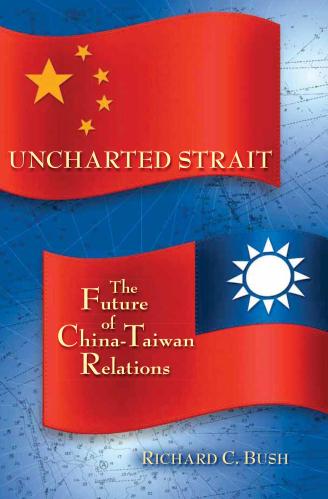
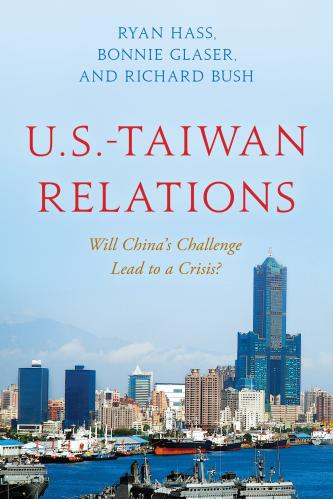
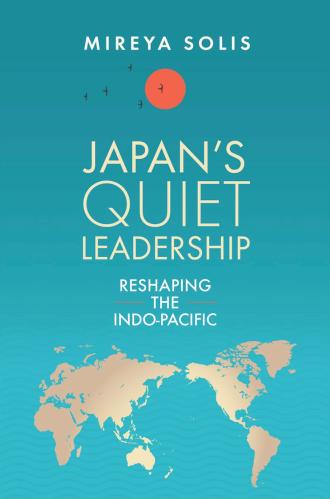
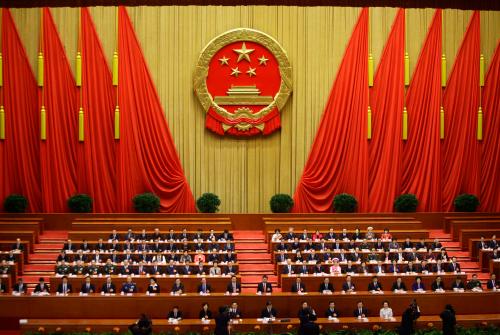
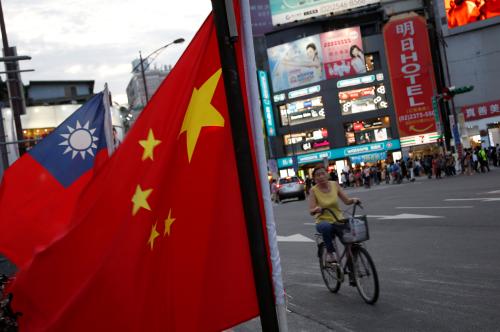
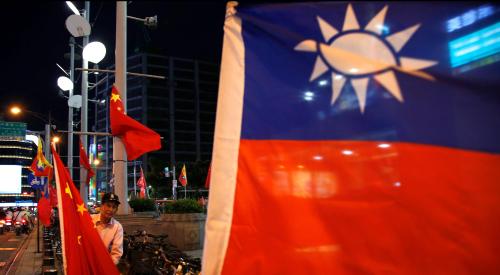

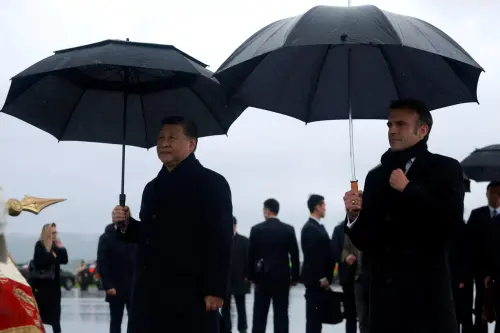

Commentary
What will Xi Jinping say about Taiwan at the 19th Party Congress?
October 4, 2017